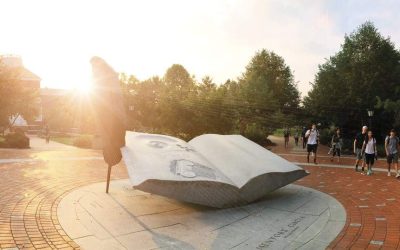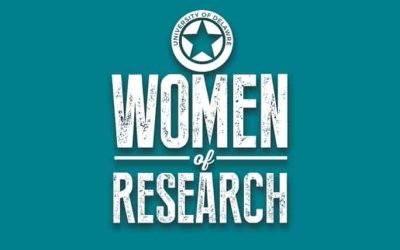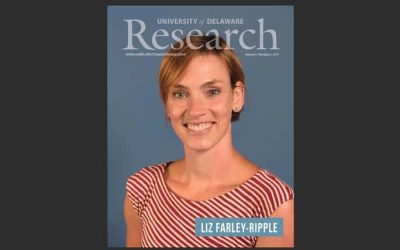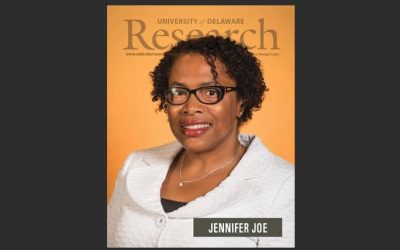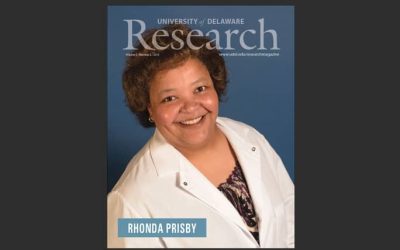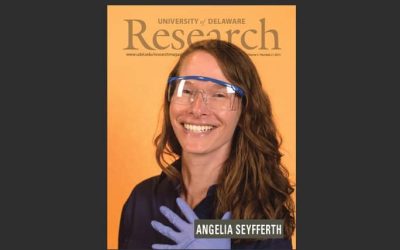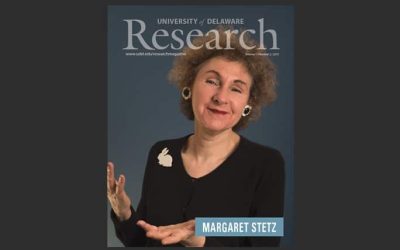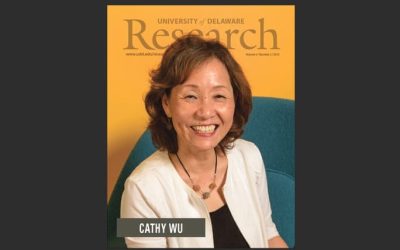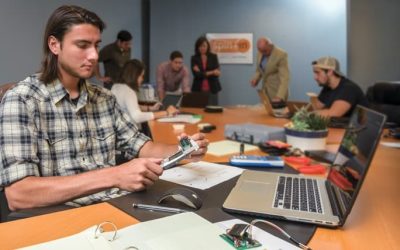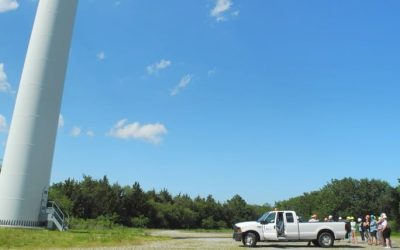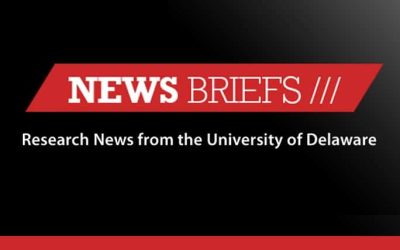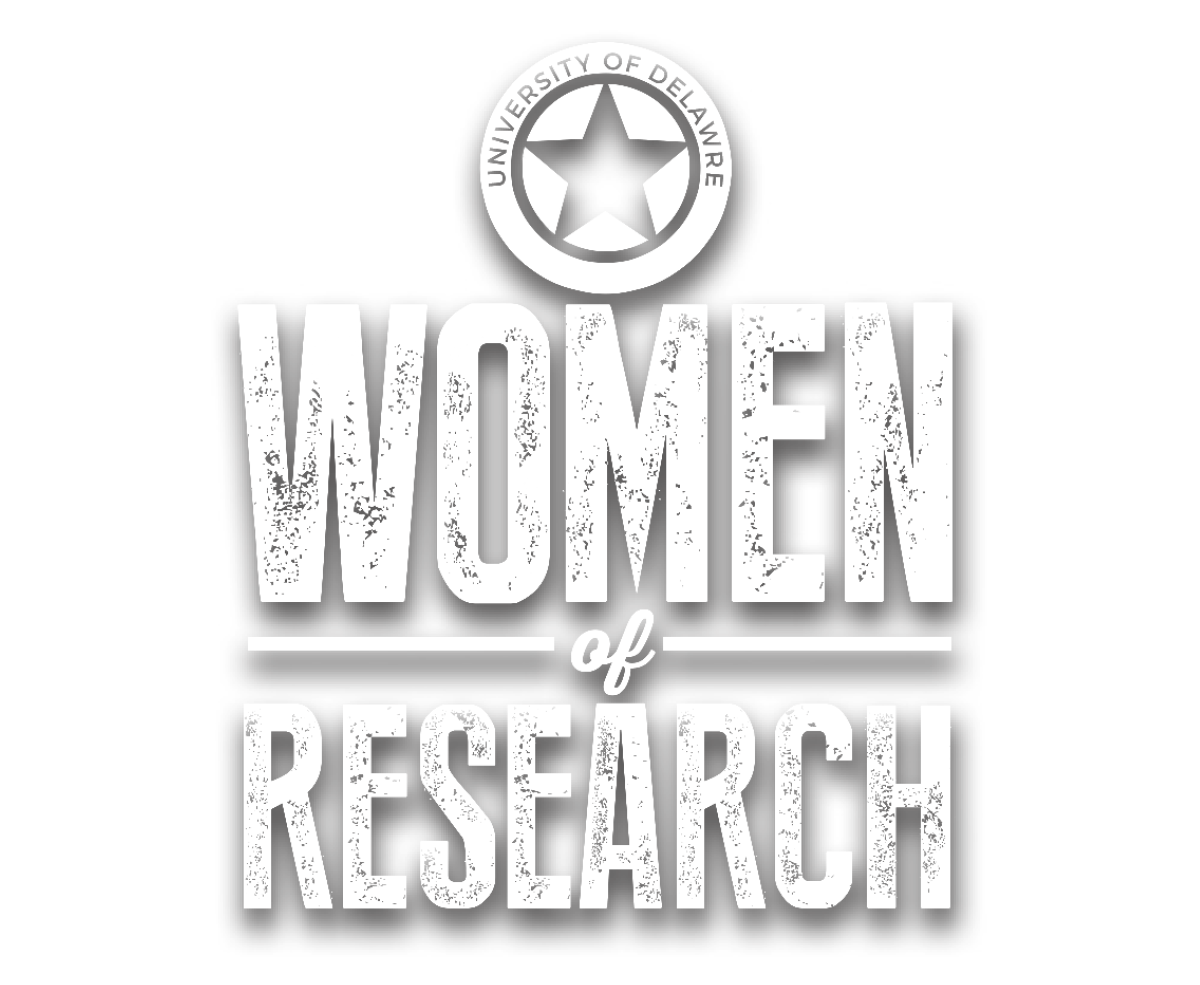


“I was 5 years old and the guide gave me a book for asking a clever question about whales,” she says.
That gift led to a conversation with her parents about marine biology, and Dixson has been asking questions ever since.
Now a tenure-track assistant professor in UD’s School of Marine Science and Policy, Dixson’s research explores how marine animals, particularly fish and corals, use sensory cues such as smell to make decisions about habitat.
Coral reefs are degrading at an alarming rate due to global warming, ocean acidification, pollution and runoff, among other things, raising important questions about the future sustainability of marine life that call the reefs home. Most fish only move in a five-meter radius of their initial settlement site throughout their lifetime.
“If they make a bad decision initially, it’s pretty much life or death,” she says.
Dixson is interested in understanding how human-induced changes are affecting these decisions and what actions can be taken to help replenish reefs that fish deem as bad.
Her research was the first to demonstrate that ocean acidification has an impact on behavioral decisions in fish. Her study revealed that while the fish grow the same and seem normal, they spend more time away from their coral and can no longer make cognitive decisions, which equates to higher mortality.
“Exposed to the smell of both a predator and reef water, a control fish in present-day ocean water will avoid the predator. Fish treated to ocean acidification levels expected by the year 2100 prefer the predator’s smell. They still sense the cue, but they no longer recognize what the smell means,” she says.
Dixson is a big thinker, and she hopes to leverage her research to affect global policy and conservation efforts.
Her research has been widely published in journals such as Science, Proceedings of the National Academy of Sciences and Marine Ecology Progress Series and has been featured in news media including the New York Times, Washington Post and NOVA.
Like the early pioneers that inspire her, including Sylvia Earle, the first female chief scientist of the U.S. National Oceanic and Atmospheric Administration, Dixson hopes her work will “serve a greater purpose.”
“When I look back on my career, I want to see that I’ve had an impact, a hand in helping the world,” says Dixson.
TRUE INSPIRATION
Danielle Dixson started asking questions about whales when she was 5 years old. A Chicago tour guide’s encouragement ignited an ongoing curiosity that has taken her around the world, diving for answers among sharks, fish, corals and other ocean creatures.
In 2013, 24.3% of full professors in science, engineering and health in the U.S. were women. — National Science Foundation
MORE STORIES
ADVANCE-ing UD
Seven faculty members are highlighted in this issue of UD Research. Indeed, there are commonalities among them—a steadfast commitment to excellence, unrelenting intellectual curiosity, mentors and role models who inspire, and a disdain for the status quo. I encourage you to read their stories to learn about their inspirations, the challenges they have faced and the scope and quality of their scholarly endeavors.
Women of Research
Extraordinary research is underway at the University of Delaware, and women are all over it. We profile seven researchers who offer insight into their work—from coral reefs to corporations—what hurdles they have cleared and what keeps them moving forward.
Liz Farley-Ripple
Elizabeth Farley-Ripple did not set out to become an education researcher. As an undergraduate at Georgetown University, she started out majoring in Latin American Studies. Then came Professor Bill McDonald’s sociology course focusing on research methods. “I had an aha moment,” says Farley-Ripple. “I realized I could have an impact—and actually apply the ideas I had been reading about.”
Jennifer Joe
Jennifer Joe, the Whitney Family Professor of Accounting in the Alfred Lerner College of Business and Economics, attributes positive experiences with her professors in college as the impetus for her pursuit of an academic career.
Rhonda Prisby
Rhonda Prisby had a plan for her master’s degree in exercise physiology. She expected to work in a cardiac rehabilitation clinic. Then a professor mentioned something she hadn’t considered—her potential as a researcher.
Angelia Seyfferth
Having had the chance to conduct research taking water samples on the Chesapeake Bay early in her undergraduate studies, Angelia Seyfferth, assistant professor in the Department of Plant and Soil Sciences, is hoping to pass her enthusiasm for research to young scholars in her lab.
Margaret Stetz
As a scholar with diverse interests from 19th-century British literature to military history and fashion studies, and who shares her work in a variety of academic and community forums, Margaret D. Stetz might be expected to have difficulty summarizing what she does.
Cathy Wu
For Cathy Wu, becoming a bioinformatics expert was kind of accidental. Armed with a Ph.D. in plant pathology and a postdoc in molecular biology, she followed her husband on a job move to Tyler, Texas, in the mid-1980s, but was unable to land a good faculty position there.
Never underestimate the power of good mentoring
A few years ago, a newly hired female faculty member had the following experience: A male colleague responded to her hallway greeting by saying hello and adding, “I hope everyone is making you feel welcome.”
Spin in spins out innovation
The University of Delaware’s “Spin In” program, founded, managed and trademarked by the Office of Economic Innovation and Partnerships, connects University undergraduate students with community entrepreneurs and early-stage startups to give them an inside look at business innovation in action and a chance to apply what they’re learning in real-life situations.
Making it clear
For the past three years, almost 90 educators from around Delaware and Maryland have been working with scientists and environmental experts from the University of Delaware and the University of Maryland. The goal is to develop a richer understanding of climate change and build effective activities and instruction plans to help their students understand the data and find potential solutions.
Solar Strong
The vast majority of the sun’s extraordinary power remains out of reach—absorbed, deflected or otherwise inaccessible to today’s power-hungry masses—but University of Delaware researchers continue their quest to capture more, store more and deploy it more efficiently.
Slaves’ lives emerge from ancient ruins
“Detfri slave of Herennius Sattius” and “Amica slave of Herennius” reads the terra-cotta tile. It was discovered atop the ancient temple in Pietrabbondante, a town tucked into the bare rock and evergreen-covered mountains more than 100 miles east of Rome.
Honors
• Dugan named Truman Scholar
• Overby elected to board of Oak Ridge consortium
• Backbone of the profession
Fearsome Fridays
Tom Fernsler, “Dr. 13,” now retired from the Delaware Center for Teacher Education, knows a lot about Friday the 13th. Do you? Take our quiz and find out!
News Briefs
• Changing the color of light
• What’s it really mean if a CEO is greedy?
• Research All-Stars field new findings




